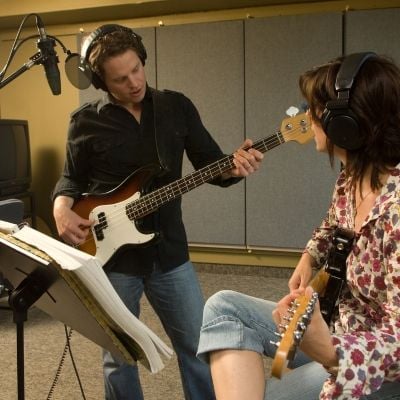How to Become a Successful Session Musician in 2023
Discover how to create a career as a session musician and key strategies for thriving in the music industry. Learn how to stand out and succeed!

This article was written by professional music composer & producer Tero Potila!
When you hear a song on the charts, it's very likely a session musician was hired to play some of the key parts in the production.
Session musicians, also known as studio musicians or backing musicians, are talented individuals hired to perform in recording sessions and live shows.
They are brought in to enhance the overall sound of a band or artist, making them an essential part of the music project.
It's a great way to make a living if you're talented and prefer to play more of a support role in a music project rather than be the main artist or a permanent band member.
How to Become a Successful Session Musician
The key is to specialize in an instrument often sought after for sessions and become proficient in it. Some great examples are instruments such as vocals, violin, cello, bass, guitar, drums or piano.
Being versatile and adapting to different music styles, genres, and environments is also important.
Life of a Session Musician
You can expect a dynamic, challenging, and creative career as a session musician.
I've worked with many session players in my music production and composition projects, and I can tell you the top session musicians all share some common personality traits; without exception, they are adaptable, reliable, and fun to work with.
The job typically requires long hours and the ability to handle tight deadlines. Your workplace will mostly consist of recording studios or live performance venues, allowing you to collaborate with various professionals in the music industry.
Roles and Responsibilities of a Session Musician
Studio Work
You'll often work in a studio environment with recording artists, producers, audio engineers, and musical directors to help create the desired sound for a track or album. The sessions can involve recording individual parts or contributing to a full ensemble recording.
You'll often need to learn new parts quickly, be able to read sheet music, and improvise based on the producer's guidance. Being flexible and adaptable in these situations is essential for a successful studio session musician.
Live Performances
Your talents as a session player may also be needed in live performances. This could be as a part of a touring band, a one-off gig, or a stand-in for a regular band member who is unavailable.
In this context, you are expected to learn and perform the band's material accurately, follow directions from the musical director, and maintain a professional stage presence throughout the performance.

Skills and Requirements for a Session Musician
Musical Skills
Your musical skills are crucial for your success. You should be proficient at playing at least one instrument, but you'll be in especially high demand if you're skilled in multiple instruments and genres. Some key musical skills to focus on include:
- Instrument mastery: You should be able to play your chosen instrument with precision, control, and expression.
- Music theory knowledge: Understanding the fundamentals of music theory will help you adapt to the requirements of the gig better.
- Ability to sight read: Read and interpret sheet music efficiently.
- Versatility: A good session musician should be able to adapt to different genres and styles of music with ease.
- Improvisation: Creating melodies, harmonies, catchy licks and riffs, and rhythms on the fly is valuable for a session musician.
Interpersonal Skills
Strong interpersonal skills are just as important as your skills as a player for building a successful career as a session musician.
Working well with others is crucial, as you'll frequently collaborate with other professional musicians, producers, and technicians. Some important interpersonal skills to cultivate include:
- Effective communication: Be able to convey your musical ideas and listen to others, ensuring a smoother working process.
- Adaptability: Handle changes and adjustments in a project with grace and flexibility.
- Punctuality: Arrive on time for rehearsals, recording sessions, and performances to show professionalism and dedication.
- Team player: Cooperate with other musicians to achieve the best possible results in a project.
Finding and Joining Sessions
Local Market
Explore your local scene to find opportunities to play as a session musician. Attend live events and network with fellow musicians, producers, and event organizers. Spread word of mouth.
Some live music venues have a house band that often hires session players. Connect with local studios.
These connections can lead to potential gigs and help you become well-known in your local music community. Be sure to bring your business card or have your contact information readily available.
Visit local music stores and rehearsal spaces to inquire about session musician opportunities or to post ads offering your services. Many musicians and bands look for session players in these environments, so being proactive and present in these spaces is essential.
Online Market
Online session musician platforms are fantastic for finding remote sessions and expanding your reach as a professional musician. Websites like Fiverr and AirGigs allow you to create a profile showcasing your skills and available services. You can browse potential clients and find projects that match your expertise.
It helps if you live in a record industry hotspot like Nashville, New York, or Los Angeles, but you can also work remotely as a session musician if you have a home studio with high-end microphones and can deliver studio-quality recordings with minimal instruction. I hire remote session musicians for my projects regularly; it’s a viable career path.
Social media is another important tool for building your online presence and attracting potential clients. Platforms like Facebook, Instagram, and X (formerly known as Twitter) allow you to connect with other musicians, bands, and producers who might be looking for session musicians.
You should regularly share samples of your work, industry insights, or even behind-the-scenes glimpses of your playing. Stay active and engaged by interacting with other artists, and always be open to forming new connections in the online music scene.

Becoming a Successful Session Musician
Strong Relationships And Networking Are Key
Building strong relationships with other musicians, producers, and people in the industry is essential.
Networking and maintaining a friendly demeanor can help you be in the right place at the right time, increasing your chances of connecting with the right person for your next gig.
Master Your Craft
To develop a strong reputation in the industry, focus on mastering your craft and honing your skills.
Practice regularly and consider taking classes or seeking mentorship from more experienced musicians. Doing so will make you a versatile, reliable, and professional musician, attracting more opportunities.
Be Adaptable
Adaptability is key, as you may need to work with different musicians, genres, and styles. Learn to play various instruments and familiarize yourself with a wide range of musical styles.
This flexibility demonstrates your ability to blend seamlessly into various projects, making you the perfect candidate for session work.
Professional Attitude And Work Ethic
In addition to your musicianship, your attitude and work ethic are crucial for a successful career. Always attend sessions prepared, open to suggestions, and willing to collaborate.
These qualities make you an easy choice for producers and help foster long-lasting work relationships with other musicians. You're bringing solutions and positive vibes rather than more problems.
Online Portfolio
To further increase your chances of success, create an online portfolio showcasing your skills and experience. Your portfolio should include recordings, live performances, and credentials or accomplishments relevant to your session musician career.
Conclusion
The popularity and demand for session musicians remain significant in today's music industry. Although technology has led to a shift towards sample-based productions, the unique talents of session musicians continue to be sought-after, especially in live music settings.
The human element professional session musicians can bring to a project is more important today than ever before.
Follow the steps I outlined to become proficient on your instrument and start networking within the industry around you. You can start building your career from local live gigs to tours and eventually land some projects for major record labels if you do it right!

